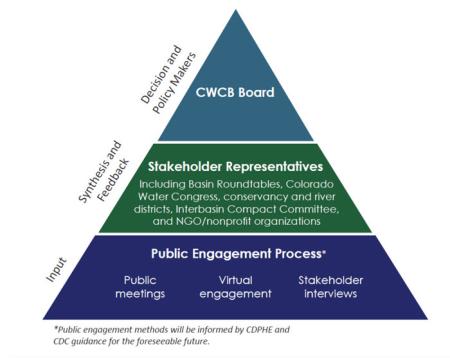Demand Management
Colorado has been investigating the feasibility of a potential Demand Management program for the state. Demand Management is the concept of temporary, voluntary, and compensated reductions in the consumptive use of water in the Upper Colorado River Basin. Each of the Upper Colorado River Basin States is conducting their own investigation to determine whether a potential program would be feasible. All Upper Basin States would have to agree such a program is feasible before such a program can be established.
While the feasibility and advisability of Demand Management remains under consideration, CWCB is exploring various other tools to address future water supply challenges as well through development of the Colorado Water Resilience Toolkit.
Demand Management Background
Colorado’s Demand Management Feasibility Investigation follows the direction from the Board in the Support and Policy Statements adopted in November 2018, which led to the 2019 Work Plan, and then the most recent Step II Work Plan approved in November 2020.
In March 2021, CWCB released the first draft Demand Management Framework, a matrix of options, or elements of feasibility - for what a potential program could look like if set up. Included below are various identified threshold issues by category. To review implementation options, equity considerations, and other details, see the full matrix.
In September 2021, CWCB adopted a decision-making roadmap for moving forward with the feasibility investigation. The roadmap identifies specific elements of the major questions of whether or not such a program would be achievable, worthwhile, and advisable from Colorado’s perspective.
In July 2022, the Upper Division States responded to Bureau of Reclamation Commissioner Camille Touton's call to action to conserve 2- 4 million are-feet of water throughout the Colorado River Basin with a 5 Point Plan, which consists of actions that Colorado, New Mexico, Utah, and Wyoming can take to help protect the Colorado River system. That plan includes considering the feasibility of a potential Demand Management Program. More information is expected in early 2023.
For more background information, view the Demand Management Frequently Asked Questions sheet or watch the introduction video.
Elements of Feasibility by Category
Threshold issues, or Elements of Feasibility, are broken down into two sections for this category: Agricultural and Transmountain.
Agricultural Projects:
- Measure water returned to stream
- Conduct a consumptive use analysis
- Estimate the residual field consumptive use
- Maintain return flows
Transmountain Projects:
- Measure water returned to stream
- Verify conserved consumptive use occurs on East Slope
All Projects:
- Coordinate environmental and other benefits
Threshold issues, or Elements of Feasibility in this category include:
- Water education to engage broad audiences/li>
- Stakeholder engagement to inform the program
- Program marketing to ensure participation
Threshold issues, or Elements of Feasibility in this category include:
- How potential environmental benefits and impacts are considered
- Assessing net benefit or impact
- Strategies to incentive benefits
- Strategies to avoid, offset, or mitigate any negative impacts
Threshold issues, or Elements of Feasibility in this category include:
- Support for municipal participants
- Municipal sector mitigation
- Consultation with local governments to track impacts and develop mitigation measures
Threshold issues, or Elements of Feasibility in this category include:>
- Agricultural sector mitigation
- Agricultural participant field requirements
- Agricultural participant assistance
Threshold issues, or Elements of Feasibility in this category include:
- Soliciting projects
- Application requirements
- Project selection process
- Localization and program evolution/li>
Threshold issues, or Elements of Feasibility in this category include:
- Range of annual costs
- Funding sources
Public Engagement Process
The CWCB is committed to a transparent and robust public engagement process to seek feedback on the draft Framework. Workshops and listening sessions were scheduled throughout Spring and Summer 2021, and feedback gathered during those events were taken into consideration. CWCB also encourages interested parties and individuals to take the public survey on Engage CWCB after reviewing the Framework. Read a text-only version of the Process Pyramid.
Upcoming Meetings
All meetings listed below are intended for various stakeholders and other interested parties to discuss and provide input on the draft Demand Management Framework. Details will be updated as information becomes available. To RSVP to a meeting below, email demandmanagement@state.co.us with your name, organization and title, and which meetings you would like to join.
| MEETING DATE | TOPIC | AGENDA | LOCATION |
|---|---|---|---|
| No meetings scheduled at this time |
Resources
- Decision-Making Roadmap (October 2021)
- Demand Management PSA Video (30-second version)
- Demand Management PSA Video (2-minute version)
- Introduction to Demand Management & Framework Video
- Framework Matrix (March 2021 Draft)
- Press release on Framework release (March 31, 2021)
- Demand Management: Frequently Asked Questions
- Step II Work Plan (November 2020)
- July 2020 Update
- March 2020 Joint Interbasin Compact Committee & Demand Management Report
- Director Rebecca Mitchell's January 2020 Update
- 2019 Work Plan for Demand Management Feasibility Investigation
- Colorado River Compact Administration
Contact
With questions or for more information, email demandmanagement@state.co.us.
